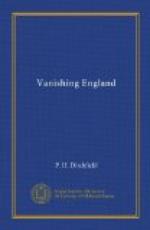“1700. Mr. Thomas Cullum buried 27 Dec. As the said Mr. Cullum was a gentleman, there is 24s. to be paid for his buriall.” The practice of heart-burial is also frequently demonstrated in our books. Extraordinary superstitions and strong beliefs, the use of talismans, amulets, and charms, astrological observations, the black art, scandals, barbarous punishments, weird customs that prevailed at man’s most important ceremonies, his baptism, marriage and burial, the binding of apprenticeships, obsolete trades, such as that of the person who is styled “aquavity man” or the “saltpetre man,” the mode of settling quarrels and disputes, duels, sports, games, brawls, the expenses of supplying a queen’s household, local customs and observances—all these find a place in these amazing records. In short, there is scarcely any feature of the social life of our forefathers which is not abundantly set forth in our parish registers. The loss of them would indeed be great and overwhelming.
As we have said, many of them have been lost by fire and other casualties, by neglect and carelessness. The guarding of the safety of those that remain is an anxious problem. Many of us would regret to part with our registers and to allow them to leave the church or town or village wherein they have reposed so long. They are part of the story of the place, and when American ladies and gentlemen come to find traces of their ancestors they love to see these records in the village where their forefathers lived, and to carry away with them a photograph of the church, some ivy from the tower, some flowers from the rectory garden, to preserve in their western homes as memorials of the place whence their family came. It would not be the same thing if they were to be referred to a dusty office in a distant town. Some wise people say that all registers should be sent to London, to the Record Office or the British Museum. That would be an impossibility. The officials of those institutions would tremble at the thought, and the glut of valuable books would make reference a toil that few could undertake. The real solution of the difficulty is that county councils should provide accommodation for all deeds and documents, that all registers should be transcribed, that copies should be deposited in the county council depository, and that the originals should still remain in the parish chest where they have lain for three centuries and a half.




